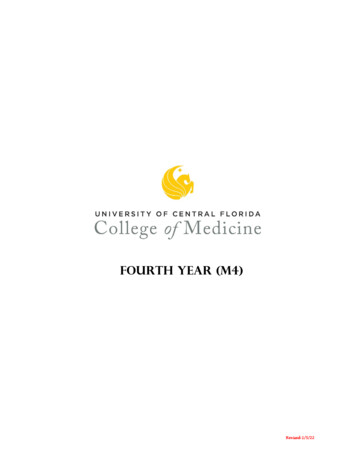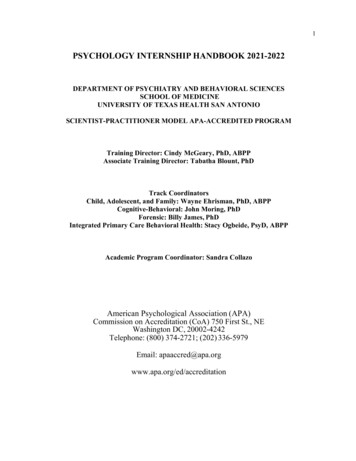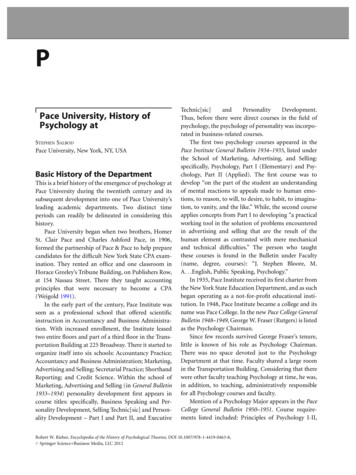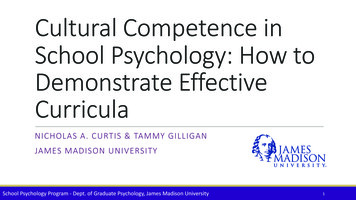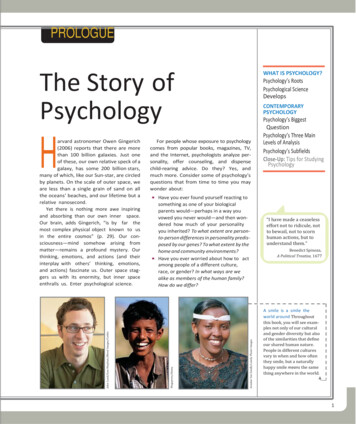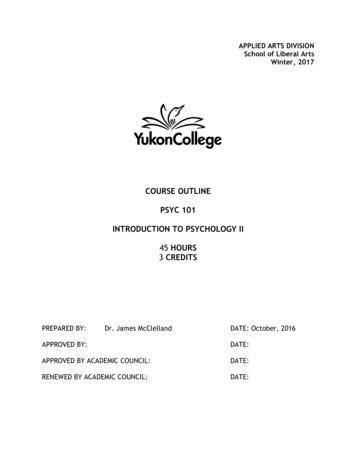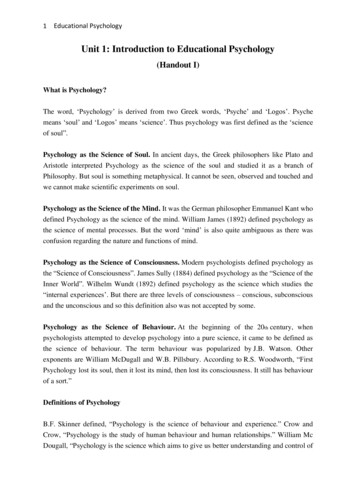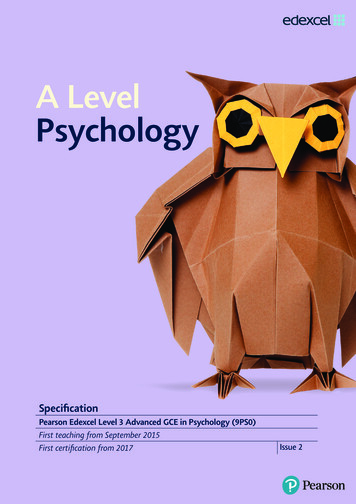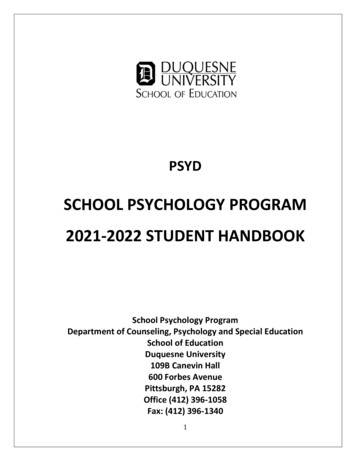
Transcription
PSYDSCHOOL PSYCHOLOGY PROGRAM2021-2022 STUDENT HANDBOOKSchool Psychology ProgramDepartment of Counseling, Psychology and Special EducationSchool of EducationDuquesne University109B Canevin Hall600 Forbes AvenuePittsburgh, PA 15282Office (412) 396-1058Fax: (412) 396-13401
Table of ContentsPSYD SCHOOL PSYCHOLOGY PROGRAM OVERVIEWTenets of the PsyD School Psychology ProgramPsyD School Psychology Mission StatementLocation and Administration of the PsyD ProgramProgram FacultyPsyD School Psychology Program Aims and CompetenciesProgram Commitment to DiversityPsyD School Psychology Program Course of Study OverviewPsyD School Psychology Program Course SequenceDoctoral Preliminary ExaminationPracticum and Internship OverviewPracticum SequencePracticum Attendance PolicyInternshipLocal Clinical Scientist Applied ProjectAdvanced Integrative Knowledge RequirementSchool Psychology Program ePortfolioFaculty-Student RelationsSchool Psychology WebsiteSchool Psychology PsyD Program Admissions ProceduresAdmissions of Practitioners Returning for a PsyD in School Psychology/Advanced StandingAdvanced Standing-Credit Transfer PolicyChange of Degree ProgramsSchool Psychology Program Student OrientationAnnual Clearances RequiredAdvisementAnnual Student Self EvaluationOngoing Evaluation of Student ProgressSchool Psychology ListservStudent Mail FoldersProgram Student FilesTest KitsPracticum and Internship LogsSchool Psychology Graduate Assistant Evaluation Procedures and TimelinesPsyD Graduation PolicyCertificationProgram Forms and DocumentsProfessional Organization Memberships/Professional DevelopmentStudent Affiliates in School Psychology (SASP)School Psychology Program AssistantshipsOther AssistantshipsRetention 42425252626262627272727282828292930
Student Remediation ProceduresDue Process: General GuidelinesFinal Grade Appeal PolicyResidency RequirementsGENERAL STUDENT RESOURCES/INFORMATIONDORIDuquesne University Student HandbookMultipassOffice of Disability ServicesOffice of Diversity and InclusionCenter for Student Wellbeing/Health ServicesGumberg Library and Curriculum CenterFinancial Aid, Health Insurance, and Student StatusStatute of Limitations/Leave of AbsenceIncomplete GradesContinuous Enrollment PoliciesWithdrawn, Inactive Status and ReadmissionIndependent StudyUniversity Weather and Emergency 353636373737
PSYD SCHOOL PSYCHOLOGY PROGRAM OVERVIEWPrincipally designed to train doctoral-level practitioners in schools, the 91-credit hour PsyDProgram is accredited by the American Psychological Association (APA) and includes coursework,practicum, an applied project demonstrating skills learned via the Local Clinical Scientist trainingmodel, and an internship. Completion of this Program leads to a MSEd in Child Psychology, a PsyD,and State School Psychology Certification. Upon completing this Program and successfully passingthe Praxis School Psychology Exam, graduates may apply for the Nationally Certified SchoolPsychologist (NCSP) credential. In addition to schools, school psychologists with a PsyD may alsopractice in hospitals, child agencies and clinics, and independent practice if one seeks licensure topractice independent psychology.APA’s Commission on Accreditation can be reached at 750 First Street NE, Washington, DC 200024242; telephone: 202.336.5979.Tenets of the PsyD School Psychology ProgramAll children can benefit from the educational environment. Attainment of this goal requires thetranslation of research and theory into effective instructional and socialization practices. Schoolpsychologists implement and advocate for these exemplary practices through data-based decisionmaking, collaboration, consultation, and demonstrating accountability to all stakeholders in termsof student achievement of cognitive and academic goals and healthy social-emotionaldevelopment. The purpose of these practices is to organize schools in ways that promote learning,prevent problems, and encourage a sense of community for all students from varied racial, cultural,ethnic, experiential, and linguistic backgrounds.To these ends, the Duquesne School Psychology Program is committed to providing students withthe necessary skills to become change agents, critical thinkers, problem solvers, moral and ethicalpractitioners, and lifelong learners who can work as colleagues within the educational community.The School Psychology Program faculty provides these necessary skills through a challenging andstimulating curriculum, practical experiences with the most skilled and ethical practitioners, andproviding ongoing service and support to students after graduation.The Duquesne University School Psychology Program is guided by the resolutions and positionstatements of NASP and APA. The Program is committed to the belief that all students have theright to a safe supportive environment. PsyD students will be engaged with and required to workwith students of diverse backgrounds (e.g. different family compositions, ethnic and cultural, ES,among other things), sexual orientation, and religious beliefs. For more information please visit:1. American Psychological Association & National Association of School Psychologists. (2015).Resolution on gender and sexual orientation diversity in children and adolescents in schools.Retrieved from : ity-schools.pdf2. National Association of School Psychologists. (2017). Resolution Affirming NASP Commitment toHigh Quality Public Education for All Children and Youth. Retrieved professional-positions/resolutions4
PsyD School Psychology Program Mission StatementThe Duquesne University School Psychology Program, guided by the belief that all children canlearn, is dedicated to providing both breadth and depth of professional training in a theoreticallyintegrated, research-based learning environment. The Program prepares ethical practitioners,scientists and scholars who are life-long learners committed to enhancing the well-being of youth,their families, and the systems that serve them. The Program achieves this by engaging in scholarlyactivities that advance the field of school psychology, maintaining a modern curriculum thatemploys aspects of multiculturalism and diversity, examining emerging trends in the profession,conducting continuous outcomes assessment for Program improvement, and providing support toour graduates.Location and Administration of the PsyD ProgramDuquesne University first opened its doors as the Pittsburgh Catholic College of the Holy Ghost inOctober 1878 with an enrollment of 40 students and a faculty of seven. Today Duquesne Universityis a progressive educational facility, which has more than tripled from its early 12.5 acres to itspresent 43-acre campus. Current enrollment is more than 9,000 students in 9 schools of study.The Duquesne University School Psychology Program is located within the Department ofCounseling, Psychology and Special Education, in the School of Education. The School of Educationis one of nine schools of study at Duquesne, and the Department of Counseling, Psychology andSpecial Education is one of three departments in the School of Education. The Interim Dean of theSchool of Education is Dr. Gretchen Generett. The Chair of the Department of Counseling,Psychology and Special Education is Dr. Deb Hyatt Burkhart. The School of Education offers theBachelor of Science degree, Master of Science in Education degree, Doctor of Psychology, theDoctor of Education degree, and the Doctor of Philosophy degree in a variety of fields of study. TheSchool of Education is accredited by NCATE.The School of Education is accredited by the Pennsylvania Department of Education and the MiddleStates Association of Colleges and Schools. The School Psychology Program, which began in 1969,offers a 30-hour Master’s Degree in Child Psychology (MSEd), a 91-hour Doctor of Psychology(PsyD) in School Psychology, and an 111-hour Doctor of Philosophy (PhD) in School Psychology.Program FacultyThe following are the core School Psychology faculty members:Laura M. Crothers, DEdProfessor of School Psychologycrothersl@duq.eduJessica Dirsmith, DEdClinical Assistant ProfessorDirsmithj@duq.edu5
Tammy L. Hughes, PhDDuquesne Professorhughest@duq.eduElizabeth McCallum, PhD (Program Director)Associate Professor of School Psychologymccallume@duq.eduKara McGoey, PhDProfessor of School Psychologymcgoeyk@duq.eduJeffrey A. Miller, PhDProfessor of School PsychologySenior Vice Provostmillerjeff@duq.eduSusan Rattan, PhDAssistant Professor of School Psychologyrattans@duq.eduAra J. Schmitt, PhDProfessor of School Psychologyschmitta2106@duq.eduCourses with a subject code of “GPSY” will be taught by the faculty members above. Courses takenwithin the PsyD degree sequence that do not carry this label will be taught by other School ofEducation and University faculty members.PsyD School Psychology Program Aims and CompetenciesThe aims and competencies of the PsyD School Psychology Program are tightly linked to APA’sStandards of Accreditation, NASP’s graduate education training standards, the Program’s trainingmodel, and current professional issues of the field. Specific PsyD Program aims and competenciesinclude the following:Aim 1: Train health service psychologists (HSPs) to deliver school psychological services.Ethical and Legal Standards Competency: Students must be knowledgeable of and act in accordance withrelevant professional standards, and legal and ethical guidelines.Individual and Cultural Diversity Competency: Students must demonstrate knowledge, awareness, sensitivity,and skills when working with diverse individuals and communities.Professional Values, Attitudes, and Behaviors Competency: Students must behave in ways that reflect thevalues and attitudes of health service psychology.6
Communication and Interpersonal Skills Competency: Student must maintain effective professionalrelationships marked by effective communication skills.Assessment Competency: Students must demonstrate competence in conducting evidence-basedassessments consistent with the scope of Health Service Psychology.Intervention Competency: Students must demonstrate competence in evidence-based interventionsconsistent with the scope of Health Service Psychology.Supervision Competency: Students must demonstrate knowledge of supervision models and practices.Consultation and interprofessional/interdisciplinary Skills Competency: Students must demonstrateknowledge of consultation models and practices, and respect for the roles and perspectives of otherprofessions.Aim 2: Train leaders in the field who promote evidence-based practices (EBPs) in the particular context inwhich psychology is being practiced.Research Competency 1: Students must demonstrate knowledge, skills, and competence sufficient tocontribute and disseminate new knowledge that is unique to the practice context.Research Competency 2: Students must critically evaluate and use existing knowledge within the practice ofhealth service psychology.Program Commitment to DiversityDuquesne University has adopted a Statement of Non-Discrimination regarding admissions andemployment ices/disability-services). ThePolicy is excerpted below:Motivated by its Catholic identity, Duquesne University values equality of opportunity, humandignity, and racial, cultural and ethnic diversity, both as an educational institution and as anemployer. Accordingly, the University prohibits and does not engage in discrimination orharassment on the basis of race, color, religion, national origin, gender, sexual orientation, age,disability or status as a veteran. Further, Duquesne University will continue to take affirmative stepsto support and advance these values consistent with the University's mission statement.This policy applies to all educational programs and activities of the University, including, but notlimited to, employment practices, admission, educational policies, scholarship and loan programs,and athletic or other University-sponsored programs. This is a commitment by the University inaccordance with its religious values and applicable federal, state and local laws and regulationsincluding Title IX of the Education Amendment Acts of 1972. Nothing herein, however, should beinterpreted as a waiver by the University of its own Constitutional and legal rights based upon itsreligious affiliation.7
Additionally, the School Psychology Program abides by a series of Administrative Policies regardingthe University’s commitment to equal educational and employment opportunities for all. Theseinclude TAP 30 Affirmative Action, Equal Educational and Employment Opportunity, and HumanRelations in the Workplace and Classroom oom), TAP 56 Americans withDisabilities Act (ADA) and Requests for Reasonable Accommodation le-accommodation), TAP 31 Sexual Misconduct and GenderDiscrimination conduct-and-gender-discrimination).As a school psychology program, we are committed to ensuring that all children receive anappropriate public education, irrespective of race, culture and background, sexual orientation,socioeconomic status, or educational need. We understand that as our nation’s schools becomemore diverse, so should the professionals trained to meet the needs of our students. We take ourefforts to recruit and retain students and faculty of diverse individual and cultural backgrounds veryseriously. For example, we offer equivalent virtual interview experiences for applicants for whomtraveling to Pittsburgh for campus interviews would be a barrier due to expense.PsyD School Psychology Program Course of Study OverviewIn order to achieve the competencies, goals, and objectives above, the faculty is committed to alearning environment which stresses an integrated, well- organized, and specific curriculum withclear expectations. Each faculty member has a strong commitment to formal and informal studentfaculty interactions that further mentor the student's educational progress, professionaldevelopment and identification with the field. The climate of the Program is one that fostershealthy scholarly debate and discourse, critical questioning of current issues and trends in the fieldand respect for diversity in theory and practice, thus creating a stimulating and enrichingeducational environment. Emphasis is placed on the preparation of competent practitioners whoare also skilled at the consumption and integration of scientific knowledge, theory, and practice.Consistent with the Local Clinical Scientist model of training, students are involved in a systematicsequence of didactic courses, applied courses, and field experiences. The sequential plan of study isdesigned to prepare students for the professional practice of school psychology by developingfoundational knowledge, skills, and professional dispositions and behavior required for school andindependent practice where the ability to examine problems of practice in the local context isemphasized. A brief, narrative overview of the PsyD course of study follows.During the first year of the Program, students are enrolled in several foundation courses designedto provide knowledge in the areas of child development, learning theories, psychologicalmeasurement, scientific methods and data analysis, and professional issues and development.Students also engage in coursework, fieldwork and practicum dealing with individual differences,design and implementation of interventions, and intellectual, behavior, and academic assessment.8
Upon completing the first 30 credits in the PsyD Program, students will be awarded the degree,Master of Science in Education (MSEd) degree in Child Psychology. It is the student’s responsibilityto obtain, complete, and submit the degree application form to obtain the MSEd in ChildPsychology.The second year of the Program builds on the student's knowledge base in psychology andeducation by providing coursework in consultation, psychotherapy, personality assessment,psychopathology, and neuropsychology. In addition, students are involved in practicum throughouttheir second year of study.The third year of the doctoral Program focuses upon the cognitive, social, biological anddevelopmental aspects of psychology, and aspects of the professional practice of schoolpsychology. In addition, students are engaged in advanced doctoral practicum experiences wherethe Local Clinical Scientist Applied Project at the advanced field site is conducted, under thesupervision of the field supervisor and two Program faculty members.The fourth year of the student's Program involves the culminating experience of a supervisedinternship in school psychology. The internship is typically a full-time experience, although a twoyear half-time internship is permissible.PsyD School Psychology Program Course SequenceFall Year 1GPSY 505: Role and Function of School Psychologists3GPSY 512: Psychological Testing3GPSY 619: Child and Adolescent Development3GPSY 692: Individual Testing3Spring Year 1GPSY 623: Behavioral Interventions3GPSY 625: Academic Interventions3GREV 610: Educational Statistics II3GPSY 511: Psychology of Learning3Summer Year 1GPSY 850: History and Systems of Psychology3GCNE 572: Child and Adolescent Counseling39
Fall Year 2GPSY 680: Consultation and Program Evaluation3GPSY 618: Personality Assessment for Intervention3GPSY 691: Psychotherapy with Children and Adolescents3GPSY 691L: Practicum I1Spring Year 2GPSY 695: Child Neuropsychology3GPSY 690: Child and Adolescent Psychopathology3GREV 701: Research Methods & Design3GPSY 693L: Practicum II1Summer Year 2GPSY 815: Ethics in School Psychology3Fall Year 3GPSY 705: Single Subject Methods for School Psychologists3GPSY 614: Organizational Consultation and Supervision for School Psychologists3GPSY 808: Early Childhood: Assessment and Intervention3GESL 501: Helping English Language Learners in Mainstream Classes3GPSY 812 L: Advanced Doctoral Practicum I1GPSY 890: Advanced Doctoral Practicum Seminar I1GPSY 905: Applied Project1Spring Year 3GPSY 807 Multicultural Psychology3GPSY 811: Biological Basis of Behavior3GPSY 612: Social Psychology3GPSY 804: Child Violence in Schools3GPSY 812 L: Advanced Doctoral Practicum II110
GPSY 891: Advanced Doctoral Practicum Seminar II1GPSY 905: Applied Project1Fall Year 4GPSY 903: School Psychology Doctoral Internship Seminar I3GPSY 901: School Psychology Doctoral Internship I1Spring Year 4GPSY 904: School Psychology Doctoral Internship Seminar II3GPSY 902: School Psychology Doctoral Internship II1TOTAL DEGREE CREDITS91Doctoral Preliminary ExaminationStudents must successfully complete a Doctoral Preliminary Examination (ComprehensiveExamination) after the second year of coursework. The Program has adopted the Praxis SeriesSchool Psychologist test administered by ETS as the comprehensive examination. More informationabout this test, as well as registration procedures, can be found at:http://www.ets.org/praxis/nasp/requirements. The Program has adopted a passing score of 147 asthis score is required by NASP to become a Nationally Certified School Psychologist (NCSP) and tobecome a certified School Psychologist in most states, including Pennsylvania. Scores should besent to Duquesne University and NASP at the time of testing. Students must pass the SchoolPsychology Praxis prior to continuing to the third year of coursework.Practicum and Internship OverviewAs a Program designed to build student competency, coursework and field experiences arecarefully sequenced so that theoretical knowledge, skill acquisition and the opportunity to enhancethese skills are fully integrated. In addition to coursework, students are expected to engage in fieldexperiences during each semester of residence consistent with appropriate ethical, professionaland legal standards. Please note that travel to a local practicum site is necessary. In order ofcompletion, the field-work sequence includes:1. First Year Field-Experiencea. Role and Function of School Psychologists field-experience (fall)b. Academic/Behavioral Interventions field-experience (spring)2. Second Year Practicuma. Practicum I (fall)b. Practicum II (spring)3. Advanced Doctoral Practicum (fall and spring semesters of third year)4. Internship11
All aspects of practicum and internship are supervised by university faculty and by appropriatelycredentialed field-based site supervisors. All site supervisors are during the first two years arecertified school psychologists as the students’ experiences occur in schools. All site supervisorsduring the third year of study are certified school psychologists and/or licensed psychologists,consistent with the requirements for practice at the specific field-site. Students must log all hoursaccrued during practicum and internship.Student competence given stage of training is required for each field-experience before advancingto the next field experience and then to internship. Competence will be determined by facultyevaluation of practicum performance and field-based supervisor ratings of performance. Theassociated faculty member will award a “Pass” or “Fail” designation for Practicum I, Practicum II,Advanced Doctoral Practicum, and Internship. All practicum, along with other course requirements,must be completed prior to being released for internship.Additionally, students complete an Evaluation of Site form (see Current Students Resources tab ofProgram Website) following each practicum experience and these are reviewed and discussed bythe Program faculty to assist in future student placement and Program planning.Please note that Child Abuse, Criminal Record, and FBI Clearances, in addition to MandatedReporter Training and TB testing, need to be renewed on an annual basis as many sites are nowrequesting up-to-date clearances. If the internship is completed out of PA, it is permissible tosubmit that state’s clearance forms. Information on obtaining clearances may be found through thefollowing link: earancesFor more information on clearances, please see Clearances section of this handbook.There is also liability insurance provided by the University to cover students during practicum andinternship. If your site requires this form, it is available in the Program Office.Practicum SequencePsyD students are required to complete a minimum of 1,000 total hours of practicum prior tointernship. If a student chooses to pursue an internship in a non-school setting, 600 practicumhours must be from a school setting. Program students are placed at practicum field sites based ontheir learning needs and, to the extent possible, their career goals. All practicum activities must belogged using Time2Track.com. Faculty will ask for hard-copies of logs to ensure students aremeeting course and practicum requirements. It is vital that students maintain accurate logs andcomplete them in a timely manner. The Program will require each student to submit a .pdf“Summary Report” from Time2Track at the completion of advanced doctoral practicum activitiesand prior to being formally approved for internship.First Year PracticumDuring the first semester of the Program, students complete several foundational courses, as wellas the first professional psychology course, GPSY 505: Role and Function of School Psychologists.12
As stated in the course description, the course is designed to “introduce prospective schoolpsychology students to the field of school psychology.” The fieldwork component of this courseprovides students with an introductory set of experiences through observations of schoolpsychologists, related service providers, general education classrooms, and special educationclassrooms. Students are strongly encouraged to engage in direct academic intervention withindividuals and groups at the field site to obtain direct intervention hours. The second semester ofthe first year involves additional educational and psychological foundation courses and providesmore advanced field work experience as part of GPSY 623: Behavioral Interventions and GPSY 625:Academic Interventions. During this experience, students will conduct a functional behaviorassessment (FBA), write a behavior intervention plan (BIP), and progress monitor an academicproblem in order to make evidence-based recommendations. Students are required to spend atleast 4 hours per week during the academic year at the first year field site and log all hours.University supervision for these experiences occurs within coursework.Second Year PracticumStudents begin the second year of the Program with increasingly advanced coursework andpracticum experiences. Practicum I is the field-experience that supports the development of skillsrelated to GCNE 572: Child and Adolescent Counseling, GPSY 691: Psychotherapy with Children andAdolescents, and GPSY 680: Consultation and Program Evaluation. Students in this practicum arerequired to carry an individual and group counseling case load, and engage in formal consultationwith schools. The forms associated with Practicum I are included on the Current StudentsResources tab of Program website and include the following: Field Placement Form, Practicum IEvaluation of the Site, and the Site Supervisor Evaluation of the Practicum Student. Universitysupervision for these experiences occurs through coursework and weekly supervision meetings.During the spring semester of the second year of the Program, the sequential progression ofpracticum experiences continues. Practicum II is designed to develop knowledge and skillsintroduced in GPSY: 505 Role and Function of School Psychologists, GPSY 512: PsychologicalTesting, GPSY 512: Psychological Testing, GPSY 618: Personality Assessment for Intervention, GPSY695: Child Neuropsychology, and GPSY 690: Child and Adolescent Psychopathology. During thisexperience, students complete comprehensive psychoeducational evaluations regardinglearning/developmental/neuropsychological problems and behavior/emotional problems, engagein problem solving teaming, and assist in the monitoring of students’ progress in a school setting.Students are encouraged to continue counseling and consultation activities, under supervision, aswell. The required Practicum II documents found on the Current Students Resources tab of theProgram website include the following: Field Placement Form, Practicum II Evaluation of the Site,and the Site Supervisor Evaluation of the Practicum Student.Students are required to spend at least 8 hours per week at the field site during the academic yearand log all hours. Due to the intensity of the practicum experience, it is anticipated that studentswill spend an additional 8 logged hours per week engaged in preparations and follow-up activities.Therefore, the Program projects that second year students will obtain approximately 16 practicumhours per week across the fall and spring semesters. University supervision for these experiencesoccurs through coursework and weekly supervision meetings.13
Advanced Doctoral PracticumDuring the third year of the Program, students continue to integrate knowledge and skills learnedin previous coursework and in ongoing advanced coursework. Students are placed at a schoolbased field-site and to the extent desired and possible, an additional field site that matches thestudent’s career goals and/or matches the student’s learning needs. A field-site that extendsbeyond the school setting for Advanced Doctoral Practicum would be considered a specializedplacement where the focus is on a particular age range (e.g., preschool only), problem type(suspected neuropsychological impairment, adjudication, etc.), or psychological activity (e.g.,primarily counseling-focused, consultation-focused, evaluation-focused, etc.). Universitysupervision for advanced practicum occurs through coursework and weekly supervision meetings.The Local Clinical Scientist Applied Project is completed at the advanced doctoral practicum site inconjunction with the field-site supervisor and two Program faculty members. A description of theLocal Clinical Scientist Applied Project may be found within this handbook. University supervision ofthis experience occurs through GPSY 890/891: Advanced Doctoral Practicum Seminar. Studentsshould spend approximately two days per week at the field site during the academic year and log allhours. By the end of this experience, all students should have obtained a minimum of 1,000 totalhours of practicum.The required Advanced Doctoral Practicum documents found on the Current Students Resourcestab of the Program website include the following: Field Placement Form, Evaluation of thePracticum Site, and the Site Supervisor Evaluation of the Practicum Student.Practicum Attendance PolicyYou are required to be present at your practicum site a minimum of four hours per week duringyour first year practicum, eight hours per week during your second year practicum, and sixteenhours per week during your third year practicum. In the event that you must miss a scheduledpracticum time, or you must leave early from your site, you are required to notify both your sitesupervisor and the University faculty member associated with the practicum placement. This willtypically take the form of an email to your site supervisor, with your University faculty cc’ed. Failureto regularly attend p
2021-2022 STUDENT HANDBOOK School Psychology Program Department of Counseling, Psychology and Special Education School of Education Duquesne University . model, and an internship. Completion of this Program leads to a MSEd in Child Psychology, a PsyD, and State School Psychology Certificati
